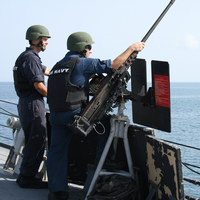ABOARD U.S.S. DONALD COOK -- In 2008, Somali pirates hijacked more than 100 large commercial vessels, provoking a massive international response. More than 40 warships from a dozen navies subsequently assembled to patrol the Gulf of Aden and the Indian Ocean. At the same time, diplomats forged consensus approaches that included U.N. declarations governing operations in Somali waters, military accords uniting formerly rival navies, and legal frameworks for prosecuting suspected pirates in various national jurisdictions.
The result, a year into this "global war on piracy," is that successful hijackings are way down. In the three months ending in September 2008, there were 17 hijackings in East African waters. In the same period this year, there was just one. The decline of piracy "is a fact," according to Steve Chick, the Royal Navy commodore of a five-ship NATO flotilla patrolling east of Djibouti under Operation Ocean Shield. World Politics Review spoke to Chick during a four-day embarkment this month on the U.S.S. Donald Cook, a U.S. destroyer assigned to NATO.

Chick attributed the suppression of piracy to several factors, including improved military coordination and the widespread adoption of better self-defense tactics by the world's shipping companies -- sailing faster, for instance, and lining a ship's railings with barbed wire to ward off boarders.

